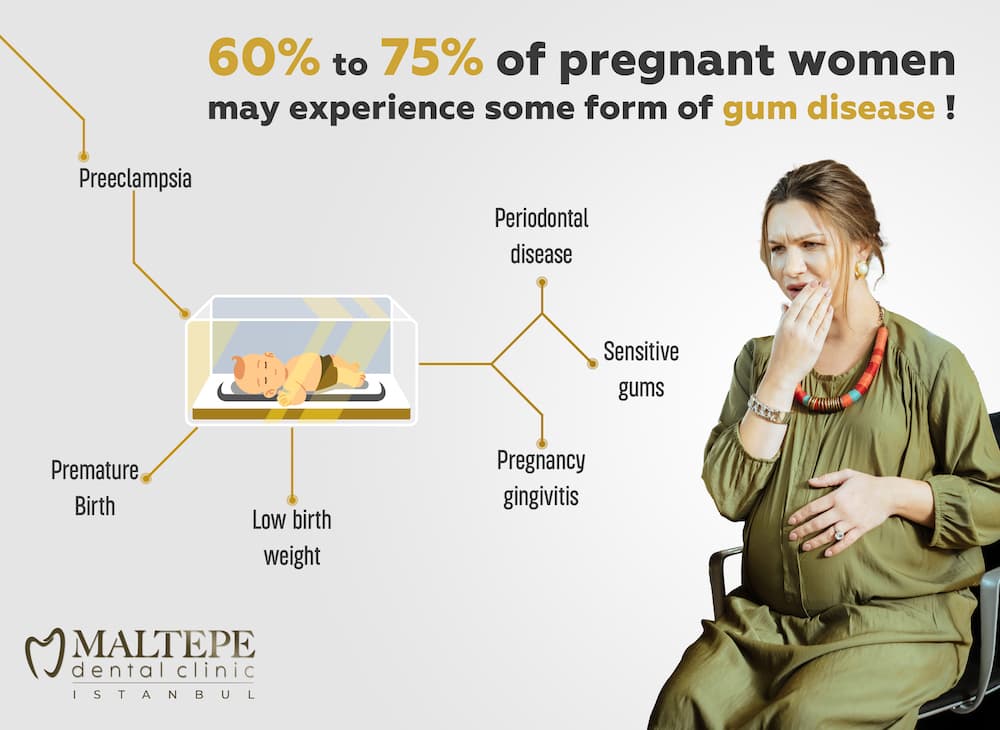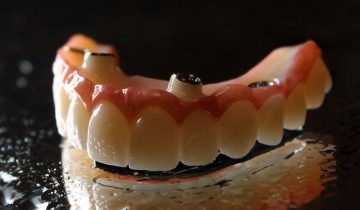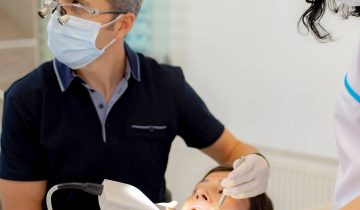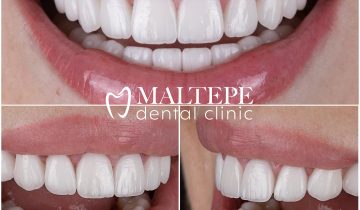Last updated on July 19th, 2023
Periodontal disease, also known as gum disease, is a serious condition that affects the tissues surrounding the teeth, including the gums and the bones that hold the teeth in place. If left untreated, it can lead to tooth loss. Now, let’s talk about how it relates to pregnancy.
Pregnancy can actually increase the risk of developing periodontal disease. This is due to hormonal changes that occur during pregnancy, which can affect your body’s response to the bacteria that cause gum disease. These changes can make your gums more susceptible to inflammation and infection, increasing the risk of periodontal disease.
This is why you might hear about a condition called “pregnancy gingivitis,” which is a mild form of gum disease that often occurs during the first or second trimester. Symptoms can include red, swollen, or bleeding gums. While it usually goes away after pregnancy, if left untreated, it can progress to a more serious form of gum disease called periodontitis.
Furthermore, there’s some research suggesting that severe periodontal disease during pregnancy can be associated with negative pregnancy outcomes, like preterm birth or low birth weight, but more research is needed in this area to fully understand the link.

What is Periodontal Disease?
Periodontal disease, also known as gum disease, is a common oral health issue that can occur during pregnancy. Pregnancy can cause changes in hormone levels that can affect the gums, making them more prone to infection and inflammation.
Symptoms of periodontal disease during pregnancy may include:
- Red, swollen, or tender gums
- Bleeding gums when brushing or flossing
- Loose teeth
- Persistent bad breath
- A change in the way your teeth fit together when you bite
If you are pregnant and experiencing any of these symptoms, it is important to see a dentist or periodontist (a dental specialist in gum disease) as soon as possible. Untreated gum disease can lead to tooth loss and negatively affect your pregnancy and your baby’s health.
To prevent periodontal disease during pregnancy, it is essential to maintain good oral hygiene, including brushing and flossing regularly and visiting the dentist for regular check-ups. Eating a healthy diet and avoiding tobacco products can also help reduce your risk of gum disease. If you have any concerns about your oral health during pregnancy, discuss them with your healthcare provider or dentist.
Why Are the Pregnant Women at a Higher Risk of Periodontal Disease?
Pregnant women are at a higher risk of developing periodontal disease due to hormonal changes that occur during pregnancy. These hormonal changes can cause the gums to become more sensitive and prone to infection.
One of the main hormones that affect the gums during pregnancy is progesterone, which is produced at higher levels. Progesterone can cause the gums to become more sensitive and more likely to bleed, leading to gum disease if not adequately addressed.
Pregnancy also causes an increase in blood flow to the gums, which can make them more prone to inflammation. This can lead to the development of gum disease if the gums are not kept clean and healthy through good oral hygiene practices.
In addition to these hormonal changes, pregnant women may also be more likely to develop gum disease due to changes in their diet and oral hygiene habits. Pregnancy can cause nausea and vomiting – often known as morning sickness, making it difficult for some women to brush and floss regularly. Pregnant women may also be more likely to eat sugary or high-carbohydrate foods, which can increase the risk of tooth decay and gum disease.
Overall, it is important for pregnant women to pay extra attention to their oral health and to see a dentist or periodontist regularly to help prevent and manage gum disease.
Is it Common for Pregnant Women to Have Periodontal Disease?

Periodontal disease is relatively common in pregnant women, According to a study published in the Journal of Obstetric, Gynecologic & Neonatal Nursing in 2016, approximately 60% to 75% of pregnant women may experience some form of gum disease during pregnancy. However, it is essential to note that the prevalence of periodontal disease during pregnancy can vary depending on a number of factors, including oral hygiene habits, diet, and overall health. Pregnant women who have good oral hygiene habits and visit the dentist regularly are less likely to develop gum disease.
Does the Presence of Periodontal Disease Cause Important Problems during Pregnancy?
Periodontal disease can cause a number of essential problems during pregnancy, both for the mother and the baby.
For the mother, untreated gum disease can lead to tooth loss, pain, and discomfort. It can also increase the risk of other health problems, such as preeclampsia and cardiovascular disease,
For the baby; According to a study published in the Journal of Natural Science, Biology and Medicine in 2010, gum disease during pregnancy has been linked to an increased risk of preterm birth and low birth weight. Preterm birth is defined as birth before 37 weeks of pregnancy, and it can lead to a number of health problems for the baby, including developmental delays and breathing problems. Low birth weight is defined as a birth weight of fewer than 2500 grams (5.5 pounds), and it can also lead to a number of health problems for the baby, including an increased risk of infection and developmental delays.
What Should Be Done to Prevent the Negative Results of Periodontal Disease?
It is important for pregnant women to pay extra attention to their oral health and to see a dentist or periodontist regularly to help prevent and manage gum disease. If you are pregnant and have concerns about oral health, discuss them with your healthcare provider or dentist.








